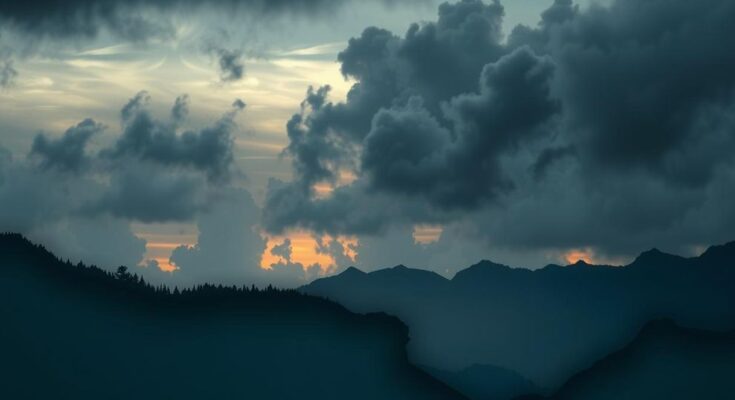Protests in Kinshasa highlight accusations against Rwandan President Kagame for supporting M23 rebels, who have occupied Goma. UN experts claim that Rwandan troops control M23 operations and provide advanced armaments. The conflict is fueled by historical tensions since the Rwandan genocide, complicating regional stability amidst resource contests.
Protests have erupted in Kinshasa, the capital of the Democratic Republic of Congo (DRC), where demonstrators express outrage against Rwandan President Paul Kagame. They accuse Rwanda of supporting the M23 rebels, who have seized significant territory, including the city of Goma. UN experts assert that the Rwandan army exercises de facto control over M23 operations, citing evidence of training and advanced weaponry provided to the rebels.
Goma, located near the Rwandan border and rich in minerals, has become a critical humanitarian hub. The conflict has caused a substantial increase in the population, as residents flee from violence that reignited in late 2021. The situation has deteriorated, with reports of intense battles and a humanitarian crisis exacerbated by disrupted services and communication.
UN peacekeeping chief Jean-Pierre Lacroix confirmed the presence of Rwandan troops in Goma, while Kagame has consistently denied these claims despite accumulating evidence. Richard Moncrief from the International Crisis Group noted a shift in rhetoric from the Rwandan government, now framing military actions as necessary for its defense.
Kagame cites the Rwandan genocide of 1994 as a foundational rationale for his government’s actions against Hutu militia groups across the border, which remain a perceived threat. The Rwandan government has intervened militarily in the DRC to prevent cross-border attacks from such groups. The situation has further complicated with M23 targeting Goma for political influence rather than strategic necessity, as it already controls more resource-rich areas.
The M23, rooted in the interests of the Tutsi minority, began its latest uprising after claiming unmet terms from a prior peace deal. International reactions have been mixed, with regional forces deployed to mitigate the conflict failing to contain M23’s actions, indicative of its operational sophistication.
Evidence shows Rwandan-trained M23 recruits undergoing extensive military training that includes practical warfare skills. Reports indicate that some children are forcibly conscripted into M23 ranks, while Rwandan officers allegedly oversee training operations. Despite denials from the Rwandan government, the evidence suggests a robust collaboration with M23 and complicity in its military advancements.
Rwanda’s perceived threats from the M23 have prompted accusations of Ugandan interference as well. Both Rwanda and Uganda have faced scrutiny for their actions in the DRC. Kagame has called for a more collaborative approach to combating Hutu militias, yet relations with the DRC government remain fraught.
Recently, the M23 captured mining locations to monopolize lucrative resources like coltan, earning substantial revenue from taxation of the trade, which involves sending minerals directly to Rwanda. There are also reports of advanced weaponry previously unattainable by other armed groups in the region being utilized by M23, indicating significant military support.
While Kagame dismisses UN reports as biased, international entities continue to mediate in the conflict. The East African Community’s involvement signals ongoing diplomatic attempts, despite President Tshisekedi’s refusal to engage amid escalating tensions over the FDLR presence. Kagame maintains that addressing this insurgency is paramount to establishing stability in the region.
The Democratic Republic of Congo has witnessed ongoing conflict, particularly in its eastern regions, largely fueled by historical tensions rooted in the 1994 Rwandan genocide. This conflict has led to the emergence of various armed groups, including the M23, which is associated with the Tutsi minority. The relationship between Rwanda and the DRC remains complex, marked by accusations of military support and intervention in domestic matters. The significant mineral resources in these areas further complicate the situation, as various parties vie for control and profit.
The escalating conflict in the DRC, particularly concerning the M23’s resurgence, underscores the intricate dynamics of regional power, historical grievances, and resource control. The evidence points towards a substantial Rwandan influence in supporting the M23, despite official denials from Rwanda. Without addressing the root causes of the conflict, especially the activities of Hutu militias, the likelihood of sustained peace in the region remains uncertain.
Original Source: www.bbc.com




